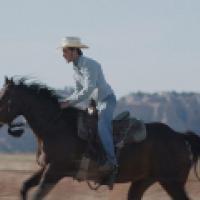Film series: Chloé Zhao's Western Visions


image from the film THE RIDER
Chinese-born director, screenwriter and producer Chloé Zhao has taken the film world by storm since the release of her first feature, Songs My Brothers Taught Me, in 2015. Just a few months ago, on April 25, 2021, she took home the Oscar for Best Director for her third feature, Nomadland (which was also awarded Best Picture). By so doing, she became only the second woman in nearly 100 years to win the Academy Award for Best Director, and the first woman of color ever nominated and to win in the category. Remarkable achievements. This November, Marvel Studios will release Eternals, her fourth feature, starring Salma Hayek, Angelina Jolie, and Kit Harington. Prior to that, Cornell Cinema will screen Zhao’s first three feature films, including her sophomore film, the highly acclaimed The Rider.
After attending boarding school in London and high school in LA, Zhao earned a bachelor's degree in political science from Mount Holyoke College, but she eventually turned to filmmaking and enrolled in New York University‘s Tisch School of the Arts to study film production. While there she made several short films, including Daughters, which won Best Student Live Action Short at the 2010 Palm Springs International ShortFest and Special Jury Prize at the 2010 Cinequest Film Festival.
Zhao had been fascinated with the American West since childhood, so when she set out to write her first feature-length screenplay, she set it on the Pine Ridge Indian Reservation in South Dakota, a film that would eventually become Songs My Brothers Taught Me, which focuses on the life of a Lakota teen who is steeling herself for the departure of her beloved older brother. Casting mostly local residents, Zhao discovered a talent for working with non-professional actors, a skill she would make use of in her next two films.
Songs My Brothers Taught Me premiered as part of the U.S. Dramatic Competition at the Sundance Film Festival and later played at the Cannes Film Festival as part of the Director's Fortnight selection. The Hollywood Reporter’s David Rooney wrote “the balance of humanistic and ethnographic filmmaking with poignant, often seemingly unscripted drama has many rewards…[and] the stark landscape, shot with an evocative sense of desolate beauty and solitude by Joshua James Richards, [is] complemented by Peter Golub’s melancholy score.” The film was nominated for an Independent Spirit Award for Best First Feature.
While making Songs, Zhao met Brady Jandreau, a Sioux cowboy working on the reservation. Jandreau later suffered a severe head injury when he was thrown off his horse during a rodeo competition. Zhao based her next film, The Rider, on his story, with Jandreau playing a fictionalized version of himself as the character Brady Blackburn. Jandreau’s father and sister were similarly cast as his character’s father and sister in the film, and Zhao elicited amazing performances from all of them.
The film confirmed the arrival of a new talent with a unique voice; Zhao was the real deal.
“Filmed with widescreen grandeur on the Pine Ridge Reservation in South Dakota, The Rider reinvigorates tropes from the western genre of men, horses, honor codes and vast expanses of nature with a refreshing lack of sentimentality, without sacrificing their inherent lyricism and poetry…. Zhao is a filmmaker of extraordinary tact and insight: She has taken a story that could have been unremarkable or too romanticized and made it into something honest, magnificent and lasting.” (Ann Hornaday, The Washington Post)
The film premiered at the Cannes Film Festival as part of the Directors' Fortnight selection and won the Art Cinema Award, and was a selection of the New York Film Festival. Zhao was nominated for Best Director and Best Feature at the 33rd Independent Spirit Awards and became the first-ever recipient of the Bonnie Award, which recognizes “the innovative vision and breakthrough work of female directors.” The National Society of Film Critics honored it as the Best Film of 2018, and we’re inclined to agree.
Like her first two films, Nomadland is set in the American West, was shot by Joshua James Richards (a fellow NYU grad with a passion for the West), features locals playing versions of themselves, and offers an absorbing and closely observed journey of self-discovery, but this time, Zhao also worked with acclaimed actors: David Strathairn and the incomparable Frances McDormand, the latter the recipient of the Best Actress Oscar for her work as Fern, a woman who has fallen by the wayside of the American Dream, but sets out to find another.
Nomadland “is not the archetypal cowboy movie. Nor does it subscribe to the idea of the West as a vast, exploitable space. The land Fern wanders has been ravaged by now-depleted manufacturing and extraction industries, and is ruled by corporations that plunder a new endless resource: cheap labor. And yet Fern is a cowboy par excellence, an arch and solitary figure, a straight-backed and stiff-legged protagonist driven from the safety of ‘civilization’ toward a different kind of existence, one set against the dusty expanse of the American West.” (Jordan Kisner, The Atlantic)
Vogue magazine wrote that Zhao has “reinvented the Western” for the 21st century, but Zhao isn’t the only female director doing so these days. Kelly Reichardt, Debra Granik and Anna Kerrigan have all made films that have probed “the isolation and alienation of people on the American ‘frontier,’” (The Atlantic), but a woman from China, that’s something.



